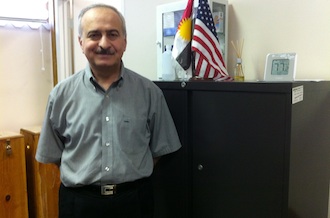Immigrants thrive in US country music capital
Foreign-born residents in Nashville, Tennessee, lean to the Democrats in a state often dominated by Republicans.

Nashville, Tennessee – Some people call it Music City, while others talk about the Athens of the South, or the Buckle of the Bible Belt. The younger generation casually refers to their home as “Cashville”.
Economically robust Nashville is a hub of the music business, higher education and religious publishing. And the Middle Tennessee metropolis has attracted more than 50,000 foreign-born residents in the last two decades.
Boasting a significant population of Latinos, East Africans, Southeast Asians and Arabs, the city has also earned the moniker “Little Kurdistan”.
While America has long been a nation of immigrants, Nashville’s appeal has only recently increased, with its low cost of living, plentiful jobs and safe streets.
But in this presidential election year, some advocates worry about changes occurring at the national level, while others fret about local political developments.
Loud voices on both the right and left suggest that there’s a problem, even as immigrants want simply to earn a living and raise their families.
During a campaign stop last October, Herman Cain aroused big Tennessee support for an electrified border fence and a proposal to place troops on the US border with “with real guns and real bullets”.
The Roane County Tea Party event at which Cain spoke featured the usual banners reading: “Let’s Take our Country Back”. And at a second rally on the campus of Tennessee Tech University, Memphis-born Cain said, “We’re going to shut off the back door so you don’t have to sneak into America.”
In the home of the Country Music Hall of Fame and Grand Ole Opry, have Nashville’s newest arrivals defied stereotypes about Tennessee’s values? And, like Atlanta, is the southern city on a path to diversity similar to major US gateways on the East and West Coasts?
Nashville’s ‘Little Kurdistan’
While they arrived in several waves, many of the predominantly Iraqi Kurds in Tennessee came after Saddam Hussein’s Anfal gassing campaign, during which thousands of people were killed. Some Kurdish arrivals had ties to NGOs that had operated around Erbil, and as part of a State Department resettlement programme under President Bill Clinton, the refugees and asylees were spread out across the 50 states.
With the largest Kurdish community in the US, many locals take pride in hosting the 11,000-strong “Little Kurdistan“.
Though there have been some culture clashes with the largely Muslim immigrants, the Kurds report feeling well-adjusted.
Kamaran Ali, 50, arrived in Tennessee in 1997. On the board of the Salahadin Centre of Nashville, he says his community feels strong support from the government.
 |
| Kurdish Nashvillians number more than 11,000 [Al Jazeera] |
“We encourage Kurds to vote and be aware of what’s going on politically,” he says.
He adds the immigration issue is not a priority during the presidential election, but that his group reaches out at the state level and through Congress.
Tawfik Ghanem, a Palestinian tyre business owner, says racism has decreased after 17 years in Nashville.
“They used to think we were from another universe,” Ghanem says. “But people have changed how they deal with immigrants.”
While shopping at the Kurdish-owned Azadi International Market, Ghanem says the Democratic Party is slightly more on the side of the immigrant community.
“We think Democrats and Republicans are 90 per cent the same for immigrants. I’m not either, but immigrants are more comfortable with Democrats, who are more flexible [with the rules]. People believe that party will increase their chances of being something in this country.”
Democratic city, Republican state
Like their Memphisian cousins, one-and-a-half-million Nashvillians form a Democratic stronghold in the Upper South.
The state whose tourist motto is “Tennessee sounds good to me” groomed music legends Elvis Presley, Johnny Cash and BB King. Democratic Vice President Al Gore, formerly a Tennessee senator, failed to sound so great and subsequently lost the state in 2000, even though Bill Clinton had won there twice, with Gore as his running mate.
Gore notably failed to garner enough support in Middle Tennessee suburbs around Nashville, which have been trending more conservative with increasing numbers of evangelical voters.
Fewer than one in 20 state residents is foreign-born. And only one in five were born outside the South. Historically the state has witnessed some the worst racial violence in the US, as the KKK was formed in Pulaski in 1866.
Within this context, Nashville has a surprisingly diverse population, perhaps more akin to Minneapolis than to Memphis. Besides Mexicans, there are significant numbers of Pashtuns, Somalis and Laotians.
The number of Nashville-Davidson County residents born outside the US tripled between 1990 and 2000. According to Census data, foreign-born people reside mostly in southeast Nashville; three-fourths of the city’s foreign-born are not US citizens, according to an immigrant community assessment by Vanderbilt University.
In the 2010 Census, the city was 60 per cent white and 28 per cent black, essentially the opposite of Memphis.
That year, Tennessee Governor Phil Bredesen signed into law a bill slightly less harsh than Arizona’s notorious anti-immigration crackdown mandating state agencies to report potential illegals to federal authorities – though the landlocked state is not near an international border.
Even if many of the older, legal immigrants feel comfortable in Nashville, undocumented workers fear the long arm of the law. And that’s just how it should be, some right-wing groups say.
‘Fix a broken system’
Mark West, a Tea Party leader from Chattanooga, Tennessee, said, “We shouldn’t ignore [what’s] on the books. We need to crack down with laws that allow us to enforce borders.”
He argues that the issue is not limited to the alleged fiscal drain: “It’s not just illegals coming in and living off our funds … It’s also national security issue.”
“We’re being threatened across all borders by groups that seek to harm us in a lethal manner,” he says, adding that failure to stem the threat constitutes a “signifcant level of negligence, almost criminal”.
|
|
| Will Tea Party policy span the globe? |
West maintains his group supports “peaceful” immigration but “not for reasons of political correctness”.
He calls for “measures to ensure that someone is not slipping through cracks like prior to 9/11”, and he asks whether the US is “applying good standards to evaluate legal immigrants”.
“I have no problem with individuals from other nations being in our community as long as they adopt our culture and our values, and seek to become one of us,” West told Al Jazeera.
He contends that an effort to give amnesty to 12 million illegal immigrants would be a strictly political manoeuvre aimed at recruiting new members for the Democratic Party. He also worries the beneficiaries would “take jobs from natural-born citizens”.
While the Tea Party activist says he opposes “sending them all home in one fell swoop”, he emphasises that “we can’t fix a broken system by breaking it more”.
But voices from the other side of the aisle believe government is focusing too much on enforcement, and not enough on providing basic social services.
‘The Latino vote counts’
Vilma Cueva, a US citizen born in Peru, was the first Hispanic person to represent Tennessee at the Democratic National Convention. She resents new laws that make it more difficult for illegal immigrants to get healthcare.
|
“They always fear that police will catch them, run their legal status and be deported“ – Vilma Cueva, Democratic delegate |
“Undocumented adults – as of October 1 – do not have access to public health facilities,” Cueva told Al Jazeera.
“Now they have to show proof of ID that they are legal – one of the bills to make their lives more miserable so ‘they can go back to their country’.
“And they always fear that police will catch them, run their legal status and be deported,” she says. “If they were white or black, they wouldn’t do that. Maybe give them a ticket, but not arrest them randomly.”
Cueva emphasises the “Latino vote counts” and focuses on “calling people to let them know where they can go” register and cast ballots.
“We’re mainly educating Hispanics so they know how to handle legal issues and be part of the community,” Cueva says.
‘Becoming more diverse’
Eben Cathey, spokesman for the Tennessee Immigrant and Refugee Rights Coalition, said parts of the greater Nashville population are resistant to change.
 |
| Nashille has seen increased ethno-religious diversity [Al Jazeera] |
“There is a handful of extremist legislators targeting immigrants,” Cathey told Al Jazeera, explaining there were 40 anti-immigration bills in 2011 at the state level.
“We need policies that allow immigrants to come here legally to allow them the opportunities that our parents and grandparents had,” says Cathey.
Twenty-eight per cent of new businesses in the US were started by immigrants, he says. “I don’t buy that they come here to take jobs and take benefits.”
Karpagam Swaminathan is an Indian-American housewife who works weekends at the Sri Ganesha Temple of Nashville. “If you live in a place so long, you consider yourself from there … and even listen to country [music].”
The 52-year-old sari-clad mother of four declares on November 6 she “won’t just vote for us and other immigrants, since our future is here.
“We are all Americans and should think about the big picture.”